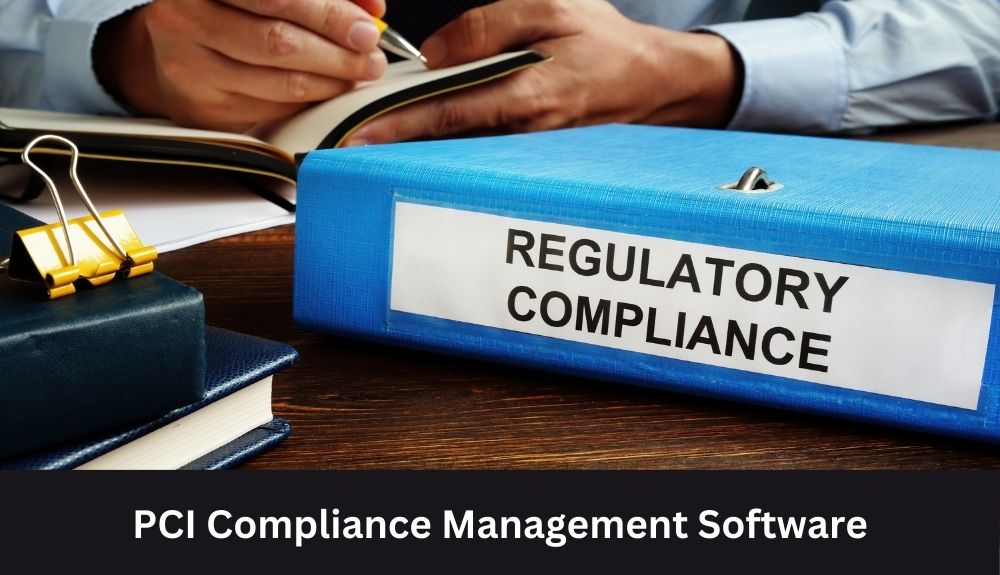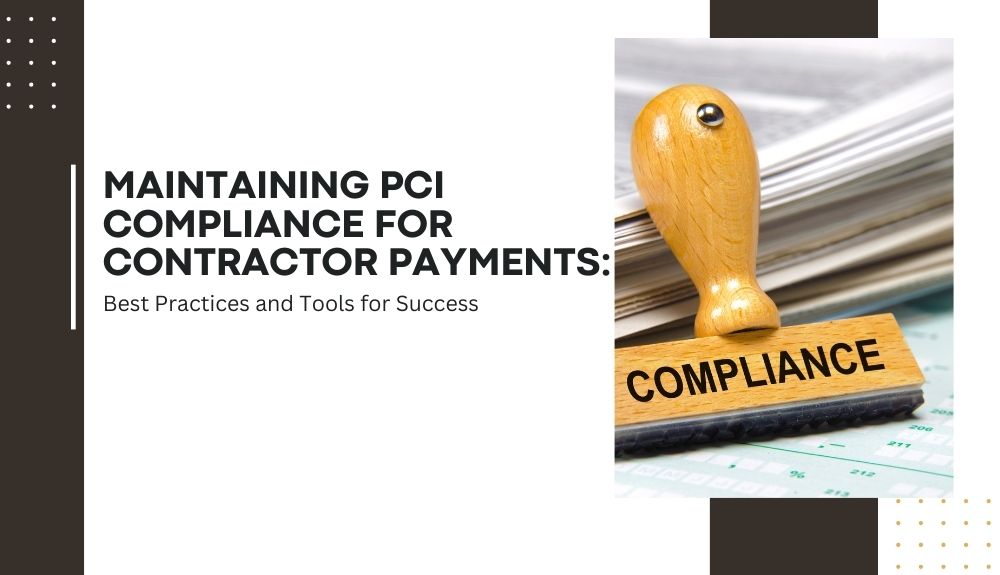Welcome to our blog post on maintaining PCI compliance for contractor payments! If you’re a business that relies on contractors, freelancers, or any type of external workforce, it’s important to ensure that your payment processes are in line with the Payment Card Industry Data Security Standard (PCI DSS). Failure to comply can not only result in hefty fines but also put your customers’ sensitive information at risk. In this article, we’ll explore the risks of non-compliance, as well as best practices and tools that can help you achieve and maintain PCI compliance. So let’s dive in and discover how to protect both your business and your contractors’ payment data!
Understanding the Risks of Non-Compliance
When it comes to contractor payments, maintaining PCI compliance is crucial for protecting sensitive information and guarding against potential risks. However, failing to comply with these standards can have serious consequences for your business.
One major risk of non-compliance is the increased likelihood of data breaches. Without proper security measures in place, hackers and cybercriminals may exploit vulnerabilities in your payment processing systems, gaining access to valuable customer data. The financial and reputational damage caused by a breach can be devastating.
Non-compliance also leaves you open to legal repercussions. In some industries, failure to meet PCI requirements can result in hefty fines or even litigation from affected customers or regulatory bodies. These costs can quickly add up and significantly impact your bottom line.
Another risk is the loss of trust from both clients and contractors. If they discover that their payment details are not adequately protected, they may choose to take their business elsewhere, damaging your reputation and potentially leading to a loss of revenue.
Additionally, non-compliant businesses may find themselves excluded from partnerships or contracts with organizations that prioritize security and PCI compliance when selecting vendors or contractors. This lack of opportunities could limit growth prospects and hinder long-term success.
In conclusion, Understanding the risks associated with non-compliance should motivate businesses to prioritize maintaining PCI compliance for contractor payments. By implementing secure payment processing systems, providing employee training on best practices, conducting regular audits and assessments, as well as utilizing encryption software, tokenization technology, and PCI compliance management software; companies can mitigate these risks while building trust among stakeholders.
Best Practices for Maintaining PCI Compliance:
Secure Payment Processing Systems
When it comes to maintaining PCI compliance for contractor payments, one of the most important best practices is ensuring that you have secure payment processing systems in place. This means using reputable and trusted vendors that offer robust security measures. Look for systems that are compliant with the Payment Card Industry Data Security Standard (PCI DSS) and regularly update their software to stay ahead of potential vulnerabilities.
Employee Training and Awareness
Another crucial aspect of maintaining PCI compliance is providing comprehensive training to your employees regarding data security and handling sensitive information. Educate them on the importance of following proper protocols when processing contractor payments, such as securely storing cardholder data and never sharing sensitive information over unsecured channels like email or chat platforms.
Regular Audits and Assessments
Regular audits and assessments are essential for identifying any weaknesses or gaps in your PCI compliance efforts. Consider conducting internal self-assessments or hiring a third-party auditor to review your systems, processes, and procedures. These assessments can help uncover any vulnerabilities or non-compliance issues so they can be addressed promptly.
It’s vital to consistently monitor your payment processing systems, ensure all necessary updates are applied promptly, maintain strong access controls, conduct regular vulnerability scans, track changes made to system configurations, log all relevant activities, restrict physical access to cardholder data storage areas – these steps will contribute significantly towards maintaining PCI compliance.
By implementing these best practices within your organization’s payment processes along with other recommended security measures from industry experts like the Payment Card Industry Security Standards Council (PCI SSC), you can greatly reduce the risk of a data breach while keeping your contractors’ financial information safe!
A. Secure Payment Processing Systems
When it comes to maintaining PCI compliance for contractor payments, one of the best practices is ensuring that you have secure payment processing systems in place. These systems are crucial for protecting sensitive cardholder data and preventing unauthorized access.
It’s important to choose a payment processor that offers robust security features. Look for providers who adhere to industry standards and offer encryption technology to protect data during transmission. This ensures that any information passed between your contractors and your organization remains confidential.
Additionally, implementing multi-factor authentication can add an extra layer of security to your payment processing systems. By requiring users to verify their identities through multiple factors such as passwords, biometrics, or tokens, you can significantly reduce the risk of fraudulent activity.
Regularly monitoring and updating your payment processing software is also essential. Keep track of any patches or updates released by the provider and apply them promptly to ensure that vulnerabilities are addressed in a timely manner.
Consider implementing additional security measures such as firewalls and intrusion detection systems (IDS) to further safeguard your payment processing systems from potential threats.
By prioritizing secure payment processing systems within your organization, you can effectively mitigate risks associated with contractor payments while maintaining PCI compliance. Remember – keeping sensitive cardholder data safe should always be a top priority!
B. Employee Training and Awareness

Employee Training and Awareness are crucial aspects of maintaining PCI compliance for contractor payments. It is not enough to have secure payment processing systems in place; employees also need to be educated on how to handle sensitive cardholder data securely.
First and foremost, all employees must understand the importance of protecting customer information. This includes training them on the potential risks associated with non-compliance, such as data breaches and financial penalties. By raising awareness about these risks, employees will be more motivated to follow proper procedures and protocols.
Regular training sessions should be conducted to keep employees up-to-date with the latest security measures and best practices. These sessions can cover topics like password hygiene, phishing prevention, and social engineering awareness. Additionally, specific training should focus on handling credit card details securely – from collecting them over the phone or through email communication to storing them safely.
In addition to initial training programs, it’s important to provide ongoing education opportunities for staff members. This could involve sharing industry news updates about emerging threats or hosting workshops where employees can discuss their experiences and share insights.
Creating a culture of security within an organization starts with effective employee training and continuous reinforcement of best practices. By investing in this aspect of PCI compliance maintenance, companies can significantly reduce the risk of data breaches while also fostering a sense of responsibility among their workforce when it comes to protecting customer information.
C. Regular Audits and Assessments
Regular audits and assessments are crucial for maintaining PCI compliance when it comes to contractor payments. These ongoing evaluations allow organizations to identify any potential vulnerabilities or shortcomings in their payment processing systems, ensuring that they stay on top of any potential risks.
During these audits and assessments, companies can review their internal policies and procedures related to data security, assess the effectiveness of their controls, and identify areas where improvements may be needed. By conducting regular checks, businesses can proactively address any issues before they lead to a breach or non-compliance.
One key aspect of these audits is penetration testing – simulating real-world attacks to test the strength of an organization’s defenses. This helps uncover weaknesses in the system that could potentially be exploited by hackers or unauthorized individuals.
Additionally, external assessments from qualified third-party providers are highly recommended as they offer an unbiased perspective on a company’s security posture. These experts can provide valuable insights into industry best practices and help organizations align with current compliance standards.
By implementing a regular schedule for audits and assessments, businesses can ensure they maintain PCI compliance over time while also staying ahead of emerging threats in the constantly evolving landscape of cybersecurity.
Tools for Achieving and Maintaining Compliance:
Encryption Software
One of the key tools in maintaining PCI compliance for contractor payments is encryption software. Encryption transforms sensitive data into unreadable code, making it virtually impossible for hackers to decipher. By implementing robust encryption protocols, contractors can ensure that their payment information remains secure throughout the entire transaction process.
Tokenization Technology
Another effective tool for achieving compliance is tokenization technology. This involves replacing cardholder data with unique tokens that have no value or meaning outside of the specific payment system being used. By using tokens instead of actual credit card numbers, contractors can significantly reduce the potential risks associated with storing sensitive customer data.
PCI Compliance Management Software
To streamline and simplify the compliance process, many organizations turn to PCI compliance management software. These tools provide a centralized platform for monitoring and managing all aspects of PCI compliance, including vulnerability scans, penetration testing, policy enforcement, and incident response.
By leveraging these powerful tools, contractors can enhance their ability to achieve and maintain PCI compliance standards effectively. It’s crucial to stay up-to-date with evolving technologies and industry best practices to ensure ongoing security when processing payments from customers securely!
A. Encryption Software
Encryption software is a crucial tool for maintaining PCI compliance when it comes to contractor payments. This technology helps protect sensitive payment information by converting it into an unreadable format that can only be deciphered with the proper decryption key.
One of the primary benefits of encryption software is its ability to secure data in transit and at rest. When contractors submit payment details, such as credit card numbers or bank account information, this data needs to be securely transmitted over networks or stored on servers. By encrypting this information, businesses can ensure that even if it were intercepted or accessed without authorization, it would be useless without the encryption key.
Additionally, encryption software offers protection against potential breaches and unauthorized access. In the event that a hacker gains access to a business’s systems, encrypted data adds an extra layer of security by making it nearly impossible for them to read or use any stolen payment information.
Furthermore, using encryption software demonstrates a commitment to protecting customer data and complying with industry regulations. It shows that businesses take their responsibility seriously and are willing to invest in robust security measures.
Implementing encryption software is essential for maintaining PCI compliance when processing contractor payments. It provides peace of mind knowing that sensitive payment information is safeguarded throughout every stage of the transaction process.
B. Tokenization Technology
Tokenization technology is a powerful tool that can help businesses maintain PCI compliance when it comes to contractor payments. So, what exactly is tokenization? In simple terms, it replaces sensitive payment data with unique identification symbols called tokens. These tokens are meaningless to anyone who may come across them, making them useless for hackers or unauthorized individuals.
By implementing tokenization technology in your payment processing systems, you remove the need to store actual credit card numbers or other sensitive information. Instead, the tokens act as placeholders that can be used for future transactions without exposing any real data.
One of the key benefits of tokenization is its versatility. It can be applied across various payment channels and environments—whether it’s online transactions, mobile payments, or even point-of-sale systems. This flexibility ensures that contractors’ payment information remains secure regardless of how they choose to receive their funds.
Furthermore, since tokenization removes the need for storing sensitive data on-site or in databases, it significantly reduces the risk of a breach occurring within your organization. Even if an attacker manages to infiltrate your system somehow, all they will find are meaningless tokens with no value.
In addition to enhancing security and reducing risk exposure, tokenization also simplifies compliance efforts by removing certain elements from scope during audits and assessments. By not storing actual cardholder data within your systems anymore but instead using tokens that have no inherent value outside their intended use context (e.g., facilitating transactions), you minimize the potential impact should there ever be a compromise.
Implementing Tokenization Technology provides a robust solution for maintaining PCI compliance in contractor payments while ensuring the utmost protection of sensitive information. Its ability to replace actual cardholder data with meaningless tokens not only enhances security but also streamlines compliance efforts by minimizing scope during audits and assessments!
C. PCI Compliance Management Software

Maintaining PCI compliance for contractor payments is crucial to protect sensitive customer data and mitigate the risk of security breaches. In this digital age, where cyber threats are on the rise, businesses must adopt best practices and utilize effective tools to ensure their payment processing systems remain secure.
One essential tool for achieving and maintaining PCI compliance is PCI Compliance Management Software. This software streamlines the process of managing compliance requirements by providing a centralized platform to monitor, track, and report on various aspects of PCI compliance.
By utilizing PCI Compliance Management Software, businesses can automate tasks such as vulnerability scanning, penetration testing, and policy enforcement. This not only saves time but also ensures that all necessary measures are in place to safeguard cardholder data.
Additionally, this software provides real-time alerts and notifications regarding any potential security vulnerabilities or non-compliant activities within the system. It enables businesses to proactively address issues before they escalate into major security breaches.
Furthermore, PCI Compliance Management Software generates comprehensive reports that can be shared with auditors or regulators during assessments or audits. These reports provide evidence of ongoing efforts towards maintaining compliance and help demonstrate a commitment to protecting customer information.
In conclusion, implementing an effective combination of best practices such as securing payment processing systems through encryption software and tokenization technology along with employee training and regular audits is critical for maintaining PCI compliance in contractor payments. Additionally, leveraging tools like PCI Compliance Management Software enhances efficiency while ensuring continuous adherence to industry regulations.
Remember that staying vigilant about maintaining strong cybersecurity measures doesn’t just protect your business; it builds trust with your customers who rely on you to keep their sensitive information safe. So invest in robust security measures today – because when it comes to protecting valuable data from cyber threats, prevention is always better than cure!
